Are your customers able to find your small business in local search results? If not, local SEO optimization is a must-have activity for you. Your business should regularly conduct a detailed local SEO audit in order to understand the requirements of a local market and accordingly maintain your local search rankings.
You see, these days, the internet has become an integral part of our lives, and to be successful, businesses need to take advantage of the advantages the web offers. Local SEO optimization is one strategy that can help small businesses stand out from the competition and gain visibility among their local target market.
For a business to rank higher on search engine results pages (SERPs), it must create content relevant to the local area and its products and services.
Table of Contents
What is a small business?
A small business is a privately owned and operated company that typically has a smaller number of employees and generates lower revenue than larger businesses. Small businesses are often started by entrepreneurs who have a particular expertise or interest in a specific industry or niche. They can range from local brick-and-mortar stores, such as restaurants and retail shops, to online businesses, such as e-commerce websites and digital marketing agencies.
Small businesses play a crucial role in the economy, as they often provide jobs and goods or services to local communities. Many small businesses are also independently owned and operated, which can lead to a more personalized and customer-focused approach to business.
Despite their smaller size, small businesses face unique challenges in the marketplace, including limited resources for marketing and advertising, competition from larger businesses, and a need to maintain profitability while keeping prices affordable for customers. Small business SEO can help small businesses improve their online visibility and attract more customers, which can lead to increased revenue and growth.
Understanding local search results
Local search results are search engine results pages (SERPs) that are tailored to a specific geographic location, such as a city or region. When a user enters a search query with a local intent, such as “restaurants near me” or “plumbers in Chicago,” search engines like Google will display a list of local businesses that match the query.
Local search results are important for businesses that rely on local customers, such as brick-and-mortar stores and service providers. By appearing in local search results, businesses can increase their visibility to potential customers and improve their chances of attracting new business.
Local SEO Basics
Local SEO optimization is the process of improving the visibility of a business in local search results. Local search results are a type of SERP that are tailored to a specific geographic location, such as a city or region. When a user enters a search query with a local intent, search engines will display a list of local businesses that match the query. This involves optimizing various aspects of a business’s online presence, such as their website, Google My Business profile, local citations, and online reviews.
The goal of local SEO optimization is to help businesses appear in relevant local search results when potential customers are searching for products or services in their local area. This can include optimizing for location-specific keywords, building local citations on directories and local business listings, and encouraging online reviews.
Read more: An Ultimate Guide to SEO for an Online Store: Tips and tricks for staying ahead of the competition
Benefits of Local SEO for small online businesses
There are the numerous benefits of Local SEO optimization for small businesses. However, the prominent ones are mentioned below:
- Increased local visibility
- Improved online reputation
- Higher website traffic and conversion rates
- Better customer engagement
- More informed decision-making
- Greater trust and credibility with customers
- Competitive advantage over other local businesses
Local SEO optimization is crucial to any small business’s digital marketing strategy. By improving their website and online presence for local search, companies can get more relevant traffic and become more visible in their area. This can lead to increased foot traffic, phone calls, and sales.
Attracting more local customers
Increased local visibility makes it easier for businesses to attract more local customers. When potential customers search for a product or service in their local area, they are more likely to click on businesses that appear at the top of the search results. By appearing prominently in local search results, businesses can increase their chances of attracting more local customers to their physical location or website. This can lead to increased foot traffic, sales, and revenue.
Improving online reputation
Local visibility can also help businesses improve their online reputation. When a business appears on the first page of local search results, it is more likely to have positive customer reviews and ratings, which can improve its online reputation and credibility. Positive reviews can also attract more customers and help the business stand out from competitors. Conversely, businesses with poor reviews or a low rating may struggle to attract new customers and may see a decline in revenue.
Enhancing brand awareness
Increased local visibility can also lead to enhanced brand awareness and recognition among potential customers. When a business appears on the first page of local search results, it is more likely to be seen by potential customers who are looking for products or services in that area. This increased exposure can lead to increased brand awareness and recognition, which can ultimately lead to increased brand loyalty and repeat business.

Better targeting of local customers
Local visibility allows businesses to target their marketing efforts specifically to local customers who are more likely to be interested in their products or services. By optimizing their online presence for local search, businesses can improve their chances of appearing in front of local customers who are actively searching for products or services in their area. This can lead to higher conversion rates and a better return on investment (ROI) for marketing efforts.
Increased competitiveness
Businesses with increased local visibility are more likely to stand out from competitors and attract more customers. This can lead to increased market share and a stronger position in the local market. By appearing prominently in local search results, businesses can gain a competitive advantage over other local businesses that are not actively optimizing their online presence for local search.
Local SEO Tips for the Beginners – TL;DR
- Optimize your website for local keywords.
- Create a Google My Business listing with accurate information.
- Build local citations and listings on high-quality directories.
- Partner with other local businesses and organizations to build backlinks.
- Create high-quality, location-specific content.
- Use social media to engage with local customers.
- Encourage positive reviews on your Google My Business listing and other relevant sites.
- Ensure that your website is mobile-friendly and has a fast loading speed.
- Monitor your online reputation and respond to reviews and comments.
- Analyze your local SEO performance using tools like Google Analytics and Google Search Console.
- Use schema markup to help search engines understand the information on your website and improve your search engine rankings.
- Include your business address and phone number on every page of your website.
- Create location-specific landing pages with unique, relevant content for each location.
- Use Google Posts to promote events, promotions, and other updates on your Google My Business listing.
- Use local keywords in your website’s meta tags and descriptions to improve your search engine visibility.
- Include local keywords in your business’s social media profiles and posts.
- Offer incentives or discounts for customers who leave reviews on your Google My Business listing or other relevant review sites.
- Use Google Maps to help customers easily find and navigate to your business location.
- Optimize your website’s images with relevant file names and alt tags that include local keywords.
- Use online tools like Moz Local or Yext to manage your local business listings and citations across multiple directories and platforms.
How to do Local SEO?
Local SEO optimization enables companies to target a specific audience in their local area through search engines, thereby increasing visibility and driving traffic to their website. Small businesses can improve their online ranking in their operating regions by utilizing local keywords, site listings, and building local backlinks.
Understand Your Local Market
To truly succeed in business, it’s essential to understand your local market. This means understanding the demographics of the area you operate in, including age ranges, income levels, and consumer trends. Knowing these details can help you to tailor your products and services to suit the needs of your target market better.
Optimizing your website for location-based keywords and phrases increases its chances of appearing in search engine results pages for users who are located near you. This can be particularly beneficial for small businesses that rely on foot traffic or who serve a specific geographical area.
Investing time in understanding and connecting with your local market can also increase customer loyalty and repeat business. Building relationships with customers in your community creates a sense of trust that can set you apart from larger competitors who may not have as strong a connection to the area. Ultimately, small businesses can capitalize on their unique strengths by prioritizing localized marketing strategies like SEO optimization and finding success within their communities.
For example, let us say, you want to promote your small business in India, you will need to consider that India is a complex and diverse country, with a local market that is equally vast and varied. To succeed in this market, businesses need to understand the cultural nuances of different regions in India and adapt their marketing strategies accordingly.
With a rapidly growing middle class and increasing digital adoption, there is a significant opportunity for businesses that cater to this segment of the market and can effectively reach customers through digital channels. However, it is important to note that there are significant regional differences in consumer behavior and preferences, which means that businesses need to tailor their marketing strategies to specific regions and adapt to local trends.
Target Relevant Local Keywords
One of the most critical factors in local SEO optimization for small businesses is targeting relevant keywords. These are the words and phrases that potential customers use when searching online for products or services related to your business. By identifying and incorporating these keywords into your website and other online content, you increase the chances of your business appearing at the top of search results.
When choosing relevant keywords, it’s important to consider short and long-tail keywords. Short-tail keywords are broad terms that describe your business or industry, whereas long-tail keywords are more specific and targeted toward a particular product or service. Including both keywords in your content can help you capture a broader range of search queries.
Additionally, it’s essential to research which keywords your competitors are targeting and create strategies to differentiate yourself from them. This can involve using unique long-tail variations of standard short-tail terms or focusing on niche areas within your industry. Targeting relevant keywords is an ongoing process that requires constant evaluation and adjustment to stay ahead in local SEO optimization for small businesses.
Optimize Your Website for Local Search
By optimizing for local search keywords, small businesses can better target their ideal audience and attract more qualified leads. 0One key benefit of local SEO optimization is increased foot traffic to brick-and-mortar locations. When potential customers search for nearby businesses on Google or other search engines, having accurate information such as business hours, phone number, and address listed can help boost trust and credibility with these prospects.
Additionally, by ensuring that your website appears at the top of local search results pages, you are more likely to drive clicks and conversions from individuals actively searching for products or services related to your business.
Create local content
Here are some of the proven techniques for creating local content that helps you to rank faster in local search results.
Create location-specific landing pages
Location-specific landing pages can help improve your visibility in local search results and provide valuable information to local customers. These pages should include information about your business, services, and products in your local area.
Highlight local customers
Sharing stories and testimonials from local customers on your website and social media can help build trust and credibility with potential customers in the local area. You can ask customers to share their experiences with your business or create case studies that showcase how your products or services have helped local customers. This type of content can be effective in attracting new customers and retaining existing ones.
Create local guides
Local guides or lists of local attractions, events, and businesses in your area can be popular with local audiences and can help attract new customers to your business. These guides should be informative, engaging, and easy to read. You can include information about the best restaurants, shopping destinations, tourist attractions, and other local landmarks. You can also partner with other local businesses to create joint promotions or discounts for customers who visit multiple locations.
Promote local events
Promoting local events on your website and social media can help build your brand awareness and attract new customers. This can include sponsoring local events or creating your own events that are relevant to your business and the local area.
Promote Your Business through Online Directories & Reviews
Online directories and reviews are great tools for promoting your business through local SEO optimization. These platforms help improve your business’s visibility online, making it easier for potential customers to find you. When you list your business on online directories like Google My Business, Yelp, and Yellow Pages, you increase its visibility in search engine results pages (SERPs). This makes it more likely that people searching for products or services in your area will come across your business.
Online reviews also play an essential role in local SEO optimization. Positive reviews from satisfied customers can boost the reputation of your business and make it appear more trustworthy to new customers. They also provide valuable feedback that can help you improve the quality of your products or services. Encouraging satisfied customers to leave positive reviews on platforms like Yelp and Google My Business can go a long way in promoting your business through local SEO optimization.
Some examples of positive reviews are:
“I recently had the pleasure of visiting this business, and I was blown away by their level of service. The staff were friendly and knowledgeable, and they went above and beyond to help me find what I was looking for. Highly recommend!”
“I recently ordered from this business online and had a great experience. The process was easy, and my order arrived quickly and in perfect condition. I will definitely be ordering from them again!”
“I visited this business for the first time and was impressed with their selection of products. The staff were helpful and made great recommendations. I will definitely be coming back!”
However, there is a hard luck sometimes, and you get negative reviews like:
“I had a really bad experience with this business. The staff were unprofessional and seemed like they didn’t care about my needs. I wouldn’t recommend them to anyone.”
“I had a terrible experience with this business. They made a mistake on my order, and when I tried to get it fixed, they were unresponsive and unhelpful. I wouldn’t recommend them to anyone.”
Now what to do?
Monitoring and responding to online reviews is an important part of local SEO optimization and can help businesses improve their online reputation, build trust with customers, and ultimately drive more business.
Responding to reviews, whether they are positive or negative, shows that you value customer feedback and are willing to listen to their concerns and suggestions. This can build trust and loyalty with customers and make them feel more invested in your business.
It can also help you engage with customers and build relationships with them. This can lead to repeat business, positive word-of-mouth referrals, and even brand advocates who promote your business to their friends and family.

Leverage Social Media for Local Engagement
Social media is an excellent tool for small businesses to engage with local audiences. Small business owners can connect with potential customers in their local communities by creating a solid presence on social media platforms like Facebook, Twitter, and Instagram. Local engagement through social media allows businesses to build customer relationships and increase brand awareness.
One way that small businesses can leverage social media for local engagement is by creating location-based content. For example, they can share photos of their products or services in different locations around the community or highlight events happening in the area. Additionally, hashtags specific to the community can help businesses reach a wider local audience.
Another effective strategy for leveraging social media for local engagement is encouraging user-generated content. Small business owners can ask customers to share photos of themselves using their products or services and use those photos as part of their social media content. This helps create a sense of community around the business and encourages others to engage with it.
Track & Measure Results of Your Efforts – Doing Local SEO Audit
To track and measure the results of your local SEO efforts, you need to start by setting clear goals and perform the local SEO audit. What do you want to achieve with your local SEO? Is it more foot traffic, increased online visibility, or better engagement with your target audience? Once you have identified these goals, you can use various tools to measure the success of your efforts. These tools include Google Analytics and Google Search Console.
Another essential aspect of tracking and measuring the results of your local SEO is monitoring your keyword rankings. Keywords are crucial to local search engine optimization since they help businesses appear in relevant searches. You should regularly check where you rank for specific keywords related to your business location, products, or services.
Additionally, tracking customer reviews is an effective way to assess the impact of your local SEO efforts on customers’ perceptions of your brand. Customer reviews offer valuable insights into how well you meet their needs and expectations while providing valuable feedback that can shape future marketing strategies. By monitoring customer reviews regularly, small businesses can adjust their approach to increase customer satisfaction and retention rates while boosting conversions and sales.
Monitor your competitors
Conducting a competitor analysis can help businesses identify areas where they can improve their online presence and stay competitive in their local market. Here are some steps to follow when conducting a competitor analysis:
- Identify competitors: Identify the top competitors in the local market. This can include businesses that offer similar products or services or businesses that target the same customer base.
- Analyze Google My Business listings: Analyze the competitors’ Google My Business listings and compare them to your own. Look at their NAP consistency, photos, reviews, and overall rating. Identify areas where they excel and areas where you can improve.
- Review backlink profiles: Analyze the competitors’ backlink profiles and identify local backlinks from trustworthy sources. Look at the anchor text and domain authority of the backlinks. Identify opportunities to build similar local backlinks for your business.
- Evaluate content: Review the competitors’ website content and identify opportunities to improve your own content. Look at the use of location-based keywords, quality of the content, and engagement with customers.
- Assess social media presence: Analyze the competitors’ social media presence and identify best practices and opportunities for improvement. Look at the frequency of posts, engagement with followers, and use of local hashtags.
- Identify unique selling points: Analyze the competitors’ unique selling points and identify areas where your business can differentiate itself. Look at the pricing, promotions, and customer service offered by competitors and identify areas where you can improve.
It’s important to regularly review and update the analysis to stay ahead of the competition and attract new customers.
here’s an example of using local hashtags:
| Type of Hashtag | Example Hashtags |
|---|---|
| Location-based | #LAfoodie, #LosAngelesEats, #DTLA |
| Event-based | #MardiGras, #JazzFest, #FrenchQuarterFest |
| Industry-specific | #yogaeverydamnday, #namasteSF, #SFfitness |
| Branded | #SeattleCoffeeCo, #NYCfoodie, #ChicagoEats |
| Local Attraction | #CentralPark, #StatueofLiberty, #BrooklynBridge |
Best Listing Websites for Businesses – Ranking higher for local search
Making a local business listing in India can be daunting, but it is critical to gaining visibility and customers. Luckily, many websites make this process easier. Whether you want to increase your online presence or list your products or services on an online marketplace, these sites have everything you need.
Google My Business
Google My Business is a valuable tool for local businesses in India to showcase their products, services, and location on Google search and maps. The platform offers a range of features like posting updates, responding to reviews, adding photos and videos, creating a website, and tracking insights about customer engagement. It is also integrated with Google Ads to help businesses reach new customers through paid advertising.
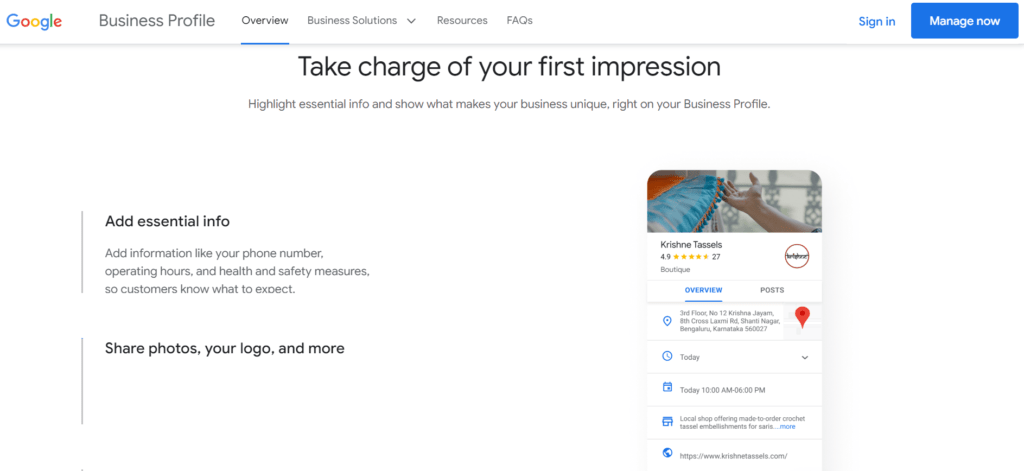
Apart from these benefits, Google My Business has become an essential factor in local SEO (Search Engine Optimization) for businesses in India. A well-optimized GMB profile can improve the visibility of a business on search results when people are searching for relevant keywords or phrases related to the company. This means more potential customers can discover the business online, potentially leading to increased foot traffic or sales.
Justdial
Justdial is one of India’s best websites for making local business listings. It is a popular search engine that helps users find information about various businesses and services in their locality. With Justdial, users can search for anything from restaurants to doctors and even book appointments through the platform.
One of the critical benefits of Justdial is its comprehensive database of local businesses across various categories. Users can access detailed information about each company, including phone numbers, addresses, and reviews from other customers. Additionally, Justdial offers multiple marketing services to help businesses increase their visibility and reach more customers.
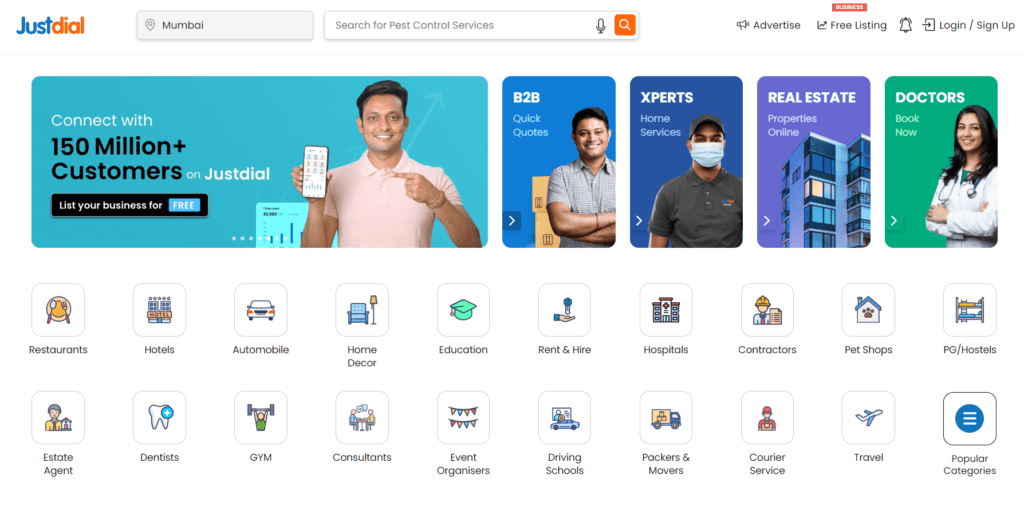
Sulekha
Sulekha is a trusted name in the Indian market regarding local search engines. Its user-friendly interface, Sulekha, makes it easy for businesses to create their listings and reach potential customers looking for their products or services. The platform offers various services, including classifieds, property listings, job postings, etc.
One of the standout features of Sulekha is its ability to match users with relevant businesses based on their location and search queries. This means that companies can target customers actively seeking out their products or services in their local area. Additionally, Sulekha offers advertising options for businesses that want to increase their visibility on the platform and attract even more customers.

IndiaMART
IndiaMART is a popular B2B online marketplace that connects buyers and sellers across various industries. It offers free and paid business listings, making it an ideal choice for small and large enterprises looking to expand their reach in the Indian market. With over five crore registered buyers and sellers, IndiaMART has emerged as one of the best websites for making local business listings in India.
One of the significant advantages of listing on IndiaMART is its easy-to-use interface that allows businesses to create their profile quickly. The platform also provides tools such as lead management systems, analytics, and mobile apps to help users manage their listings more effectively. Moreover, with millions of monthly visitors from across the globe, IndiaMART offers excellent visibility for businesses looking to attract new customers.
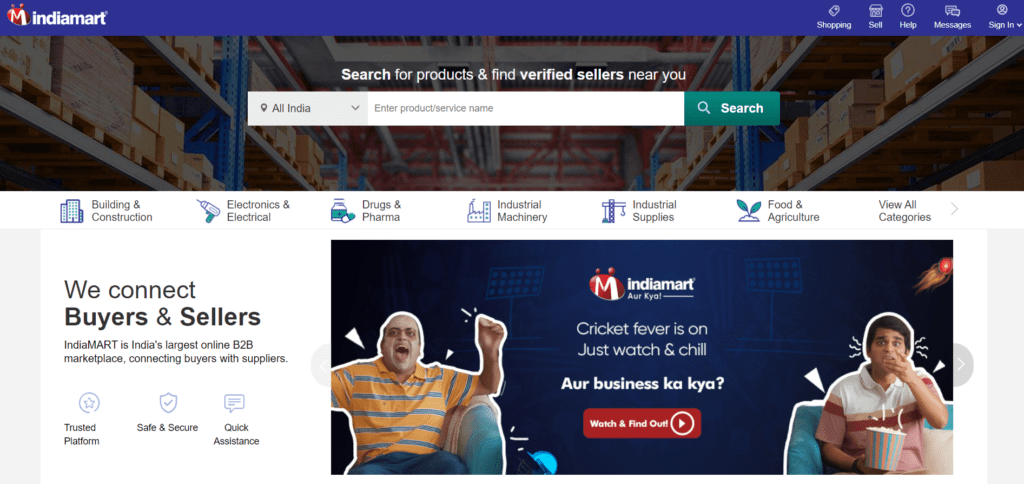
Tradeindia
Tradeindia is a well-established B2B marketplace that offers a wide range of business listings for various industries. It has over 5 million registered buyers and sellers, making it one of the largest online platforms in India. The website offers free and paid membership plans for businesses to list their products and services. This helps them reach a wider audience and increase their sales potential.
One unique feature of Tradeindia is its virtual trade shows. These online events bring together buyers and sellers from different industries to showcase their products, connect with potential clients, and network with industry experts. This provides an excellent opportunity for businesses to expand their reach beyond local markets.

Yelp
Yelp is a popular online directory and review site where users can search for businesses and leave reviews. The site was founded in 2004 and currently has over 200 million monthly visitors. Yelp allows businesses to claim their page and manage their online reputation by responding to customer reviews, updating their business information, and adding photos and other content.

Yelp also offers a variety of features to help users find and connect with local businesses. Users can search for businesses by location, category, price, and other criteria, and can also view menus, photos, and other information about businesses. Yelp also offers a mobile app for users on-the-go, which includes features like turn-by-turn directions and the ability to make reservations.
For small businesses, Yelp can be a valuable tool for improving local SEO and attracting new customers. By claiming your Yelp page and responding to customer reviews, you can improve your online reputation and build trust with potential customers. You can also use Yelp to share photos and other content that showcases your products or services, and to connect with potential customers who are searching for businesses like yours.
It’s important to note that Yelp has strict policies about soliciting customer reviews, and businesses should not offer incentives in exchange for positive reviews. Yelp also uses a proprietary algorithm to filter out reviews that it deems suspicious or fake, so businesses should focus on providing excellent customer service and let their reviews speak for themselves.
Yellow Pages India
One of the top websites for making local business listings in India is Yellow Pages India. Its comprehensive directory of businesses across various categories allows users to find the products or services they need quickly. The website offers free and paid listings, enabling business owners to choose the best.
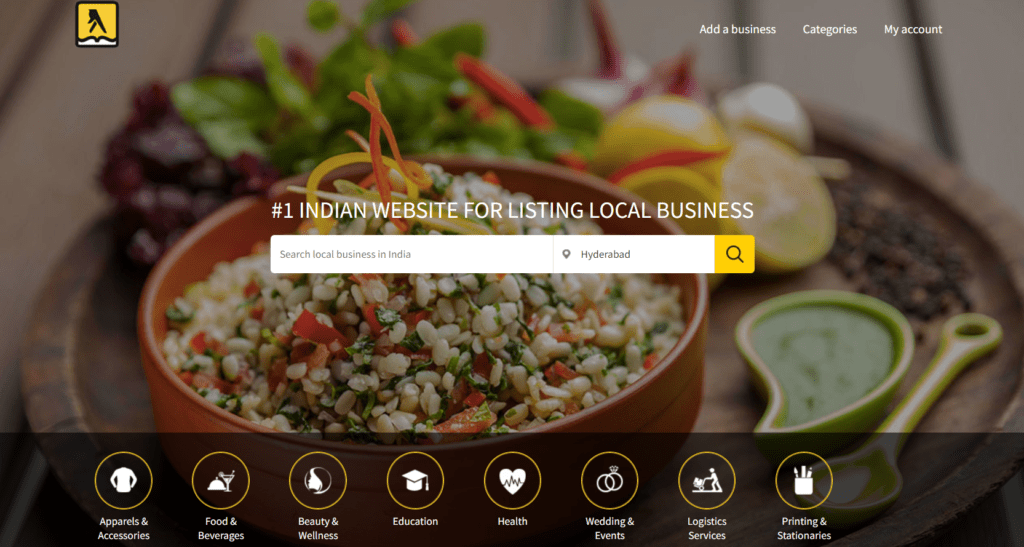
In addition to listing businesses, Yellow Pages India also offers advertising and lead generation services. These services can help companies to increase reach and generate more leads by promoting their products or services to a broader audience. Yellow Pages India is an excellent resource for consumers and businesses looking to connect in India’s vibrant local market.
Overall, many websites are available in India for making local business listings. Businesses must choose the platforms most relevant to their industry and target audiences for the best results.
Building citations and listings on directories – How to choose?
There are a variety of local business directories available that businesses can list themselves in, including industry-specific directories, general business directories, and local chamber of commerce directories. It’s important to focus on directories that are relevant to your business and location, as well as those that are high-quality and reputable.
Businesses should conduct research to identify the most relevant local business directories for their industry and location. This can include searching for local directories using search engines or using online tools like Moz Local or Yext.
Remember to focus on the directories that are most relevant to your business and industry. It’s important to maintain accurate and consistent information across all directories and listings, and to encourage customer reviews on these directories. Start by building listings on the most popular directories like:
How to optimize your Google My Business account?
Optimizing your Google My Business (GMB) listing is critical for improving your visibility in local search results.
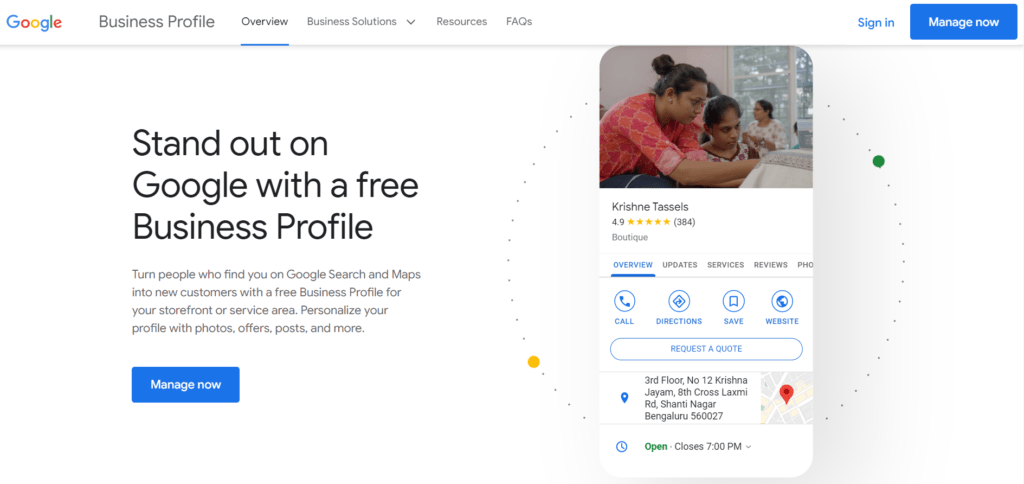
Here are some key steps to optimize your GMB listing:
- Claim and verify your listing: The first step in optimizing your GMB listing is to claim and verify it. This will ensure that you have full control over the information displayed in your listing and that you can respond to reviews and messages.
- Provide accurate information: Make sure that your listing includes accurate information about your business, including your business name, address, phone number, and website URL. This information should be consistent across all online directories and listings.
- Add high-quality images: Adding high-quality photos of your business, products, and services can make your listing more attractive to potential customers. Make sure that the images are relevant and accurately represent your business.
- Include relevant keywords: Including relevant keywords in your GMB listing can help Google better understand what your business offers and improve its visibility in local search results. Make sure to include keywords that are specific to your industry and location.
- Encourage customer reviews: Positive customer reviews can improve your local visibility and attract more customers to your business. Encourage your customers to leave reviews on your GMB listing, and respond to them in a timely and professional manner.
- Use GMB features: Take advantage of the various features available on GMB, such as adding products and services, creating posts, and enabling messaging. These features can help improve your visibility and engagement with potential customers.
- Monitor your listing: Regularly monitor your GMB listing to ensure that all information is up-to-date and accurate. Respond to customer reviews and messages promptly and professionally. It helps to build trust and credibilty among your customers.
It’s important to regularly monitor and update your GMB listing to ensure that it remains accurate and up-to-date. This will help attract more local customers to your business and ultimately lead to increased revenue.
Using Online Tools for Managing Local Business Listings and Citations
To manage your local business listings and citations across multiple directories and platforms, consider using online tools like Moz Local or Yext. These tools can help businesses ensure that their business information is accurate and consistent across all listings and directories, which can improve their online visibility and reputation.
Moz Local is an online tool that helps businesses manage their local business listings and citations across a network of over 15 different directories, including Google, Bing, and Facebook. With Moz Local, businesses can create and manage their listings, ensuring that their business information is accurate and consistent across all platforms.
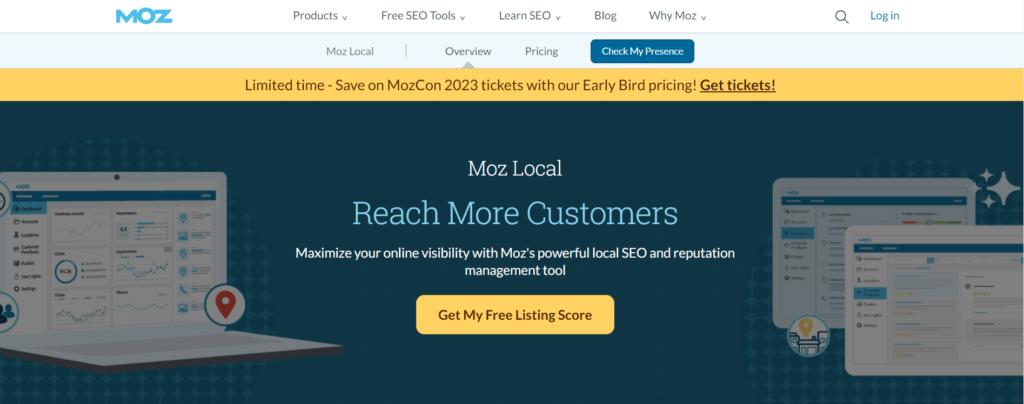
One of the key features of Moz Local is location data management. This feature helps businesses to ensure that their business information, such as the business name, address, phone number, and website, is accurate and consistent across all directories. This can help improve the business’s online visibility and reputation, making it easier for potential customers to find them online.
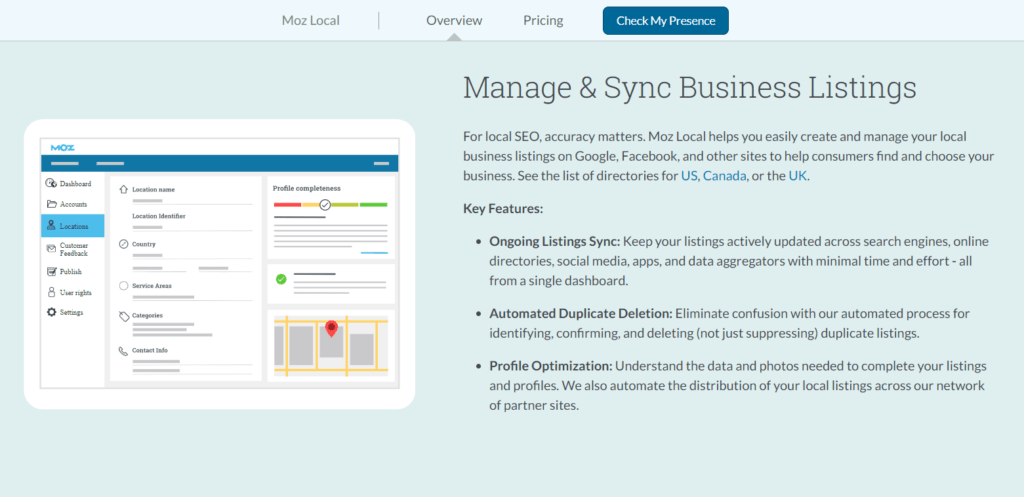
In addition to location data management, Moz Local also provides review monitoring. This feature allows businesses to track and respond to reviews from customers across various review sites, including Google, Yelp, and Facebook. By responding to reviews and addressing customer concerns, businesses can improve their online reputation and build trust with potential customers.
Another useful feature of Moz Local is local reporting. This feature provides businesses with insights into their local search performance, including data on search rankings, visibility, and listing accuracy. This data can help businesses identify areas for improvement and adjust their local SEO strategy accordingly.
Yext is another comprehensive online tool that helps businesses manage their online presence across multiple directories and platforms, including popular ones like Google, Yelp, and Facebook. The tool offers a range of features designed to assist businesses in ensuring that their business information is up-to-date and consistent across all platforms.
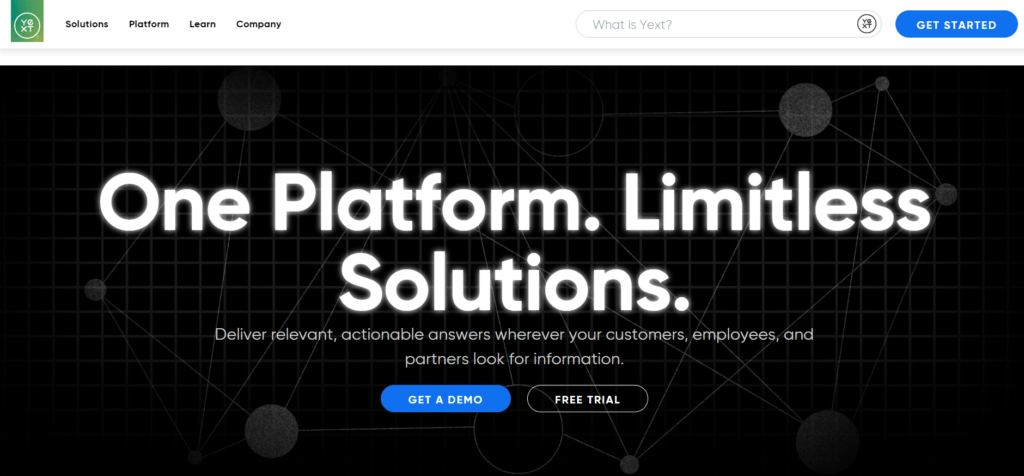
One of the key benefits of Yext is that it enables businesses to make changes to their business information in real-time, which is then automatically updated across all directories and platforms. This feature saves businesses time and effort by eliminating the need to manually update their information on each individual directory.
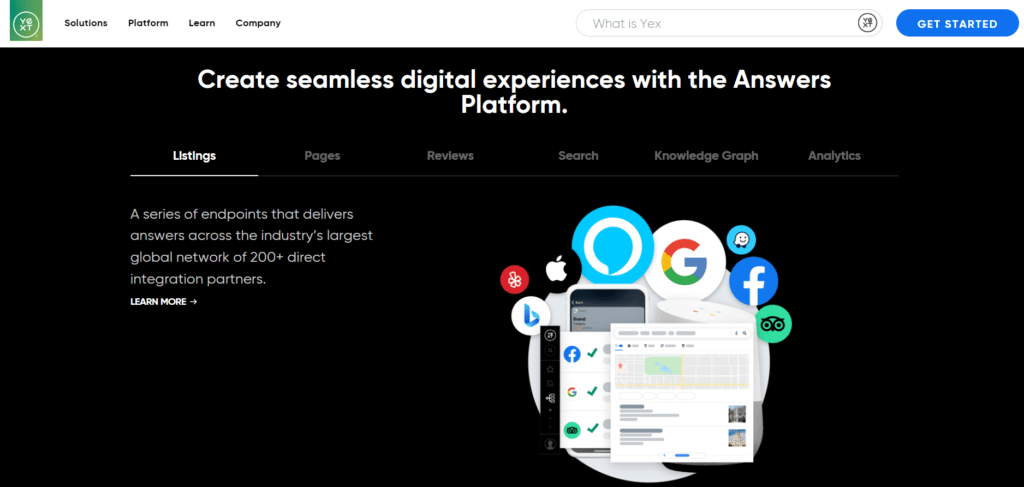
Review monitoring capability of Yext enables businesses to monitor and respond to customer reviews across multiple directories and platforms. This helps businesses build a positive online reputation and foster better relationships with customers.
Yext also offers analytics and reporting features that help businesses track their local SEO performance and identify areas for improvement. These insights cover important metrics like search engine rankings, website traffic, and customer engagement, allowing businesses to make data-driven decisions to improve their online presence.
both Moz Local and Yext are excellent tools for managing local business listings and citations. The choice between them depends on the specific needs and budget of the business. Small businesses with limited budgets may find Moz Local to be the better option, while larger businesses with more complex needs may prefer Yext.
Keep in mind – Paid search still matters
Yes, paid search results are still an important part of search engine results pages (SERPs), and can play a significant role in a business’s online visibility and success. Paid search results are often displayed at the top of search results pages and are marked as “Ad” or “Sponsored” to differentiate them from organic search results.
Businesses can use pay-per-click (PPC) advertising to bid on relevant keywords and phrases and create ads that appear in the paid search results section of SERPs. When a user clicks on one of these ads, the business is charged a fee by the search engine.
Paid search results can be a valuable tool for businesses that want to improve their online visibility and attract more targeted traffic to their website. By bidding on relevant keywords and creating compelling ad copy, businesses can reach potential customers who are actively searching for products or services related to their business.
However, it’s important for businesses to use paid search results strategically and budget effectively, as PPC advertising can become expensive if not managed carefully. It’s also important for businesses to focus on creating high-quality content and optimizing their website for search engines to improve their organic search rankings and reduce their reliance on paid search results over time.
Conclusion: Reap the Benefits of Local SEO
Optimizing your website for local SEO can provide countless benefits for small businesses. With the rise in mobile searches and voice assistants, local SEO has become more critical than ever. Using keywords specific to a location and making localized content can bring customers close by to look for your products or services.
Local SEO optimization also helps your site show up higher in search engine results pages (SERPs), which can lead to more organic traffic and possible leads. Additionally, claiming your Google My Business listing and ensuring accurate NAP (name, address, and phone number) information across all online directories can improve trust and credibility with search engines and customers.
Investing time and resources into local SEO optimization can significantly benefit small businesses by increasing online visibility, driving foot traffic to their physical locations, and boosting revenue. Don’t miss out on this valuable opportunity to connect with nearby customers and grow your business.
Frequently Asked Questions
What is local SEO optimization?
Local SEO optimization is the process of improving the visibility of a business in local search results. It involves optimizing various factors, both on and off a website, to help search engines better understand a business’s relevance and location to a specific geographic area. Local SEO optimization includes various tactics such as: Keyword research, On-page optimization, Google My Business optimization, Building local citations, Earning local backlinks, etc.
Why is local SEO important for small businesses?
Local SEO is essential for small businesses because it helps them reach potential customers in their local area. By optimizing their website and online presence for local search, small businesses can improve their visibility in search results and attract more local customers.
How does local SEO work?
Local SEO works by optimizing a website’s content and structure for location-based keywords and creating local business listings on various directories and platforms. This helps search engines understand the business’s location and relevance to local search queries.
What are the benefits of local SEO for small businesses?
Small businesses can benefit from local SEO by being more visible in local search results, getting more website traffic and sales, improving their online reputation, and marketing to a more specific audience.
What are some quick effect strategies for improving local SEO?
Optimizing for location-based keywords, creating local business listings on different directories, building a robust online reputation through customer reviews, and optimizing mobile searches are all ways to improve local SEO.
How long does it take to see results from local SEO?
The timeline for seeing results from local SEO can vary depending on the competitiveness of the local market and the specific strategies implemented. Generally, it can take several months to see significant improvements in local search rankings and website traffic. If you don’t see any results for a very long time, you will need to revise your marketing startegy. This may include target audiwnce, keywords or may even demand for changing marketing channels.
What are some common mistakes to avoid in local SEO?
Some common mistakes to avoid in local SEO include neglecting to claim and optimize local business listings, using duplicate or irrelevant content on multiple pages, and failing to monitor and respond to customer reviews.
How can small businesses measure the success of their local SEO efforts?
Small businesses can measure the success of their local SEO efforts by tracking their search engine rankings, website traffic, and customer engagement metrics such as reviews and social media activity.







